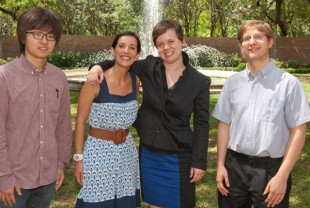The awards honor skill, innovation and good, old-fashioned research
For four Rice students, long hours in the library have just paid off. Three graduate students and one sophomore have won Fondren Library Research Awards.
The grants, given annually, are funded by the Friends of Fondren Library. The group’s board heard brief presentations from each winner Thursday afternoon.
This was the fourth year for the prizes, which are designed to recognize student projects that demonstrate “extraordinary skill and creativity” in using the library’s resources for original scholarship. To enter, students submit a research project they have completed in the past year, then augment that with a 1,000-word essay that explains how they used Fondren’s resources.
Seeing the students’ projects “has been really helpful for the library staff,” said Sara Lowman, vice provost and university librarian. “They kind of serve as an ethnographic study for the librarians to see how students are currently doing research and using library resources.”

Liang Wang, Olivia Wolf, Rachel Hooper and Renaud Boucher-Browning, Fondren Library Research Award winners, presented their research to the Friends of Fondren board Thursday.
This year’s winners entered research in the fields of music, architecture and art history. The students used an impressive array of library resources to complete their research; their materials ranged from 19th-century tomes housed in the Woodson Research Center to online databases the students could access on their laptops.
Renaud Boucher-Browning, a Will Rice College sophomore, won the $1,000 undergraduate prize for his project, “From Theory to Practice: Reflections of Juan Bermudo and Francisco Salinas in Francisco Guerrero’s ‘Canciones y Villanescas Espirituales.’”
For the Shepherd School of Music student, who is majoring in string bass performance, the project stemmed from a music history assignment to examine the text-music relationship in Renaissance vocal music. Boucher-Browning studied the work of two 16th-century music theorists, then applied their theories to compositions by Francisco Guerrero, a composer in Renaissance Spain.
He used Fondren’s Brown Fine Arts Library to find many of his materials; the rest he obtained through interlibrary loan. Boucher-Browning used a CD of Guerrero’s work he found in the Fondren collection, and he played a bit of that recording for his audience Thursday.
“This, above all, is the most important part of my research,” he said, “increasing knowledge and awareness of this music so we can continue to enjoy it.”
Liang Wang, a graduate student in the Rice School of Architecture, won the $1,000 first prize in the graduate student category for his project, “Re-forming and Re-presenting a Public Library.” The design project was a plan for a public library to be built in a multicultural northwest Houston neighborhood – one that would be used by English-speaking and Spanish-speaking patrons.
Wang used Fondren Library to gather information about demographics and urban infrastructure, he said. He also arranged a tour of both Fondren and the off-campus Library Service Center. The tours gave him a good feel for how libraries can use their space, he said.
“The Fondren Library not only provided us resources for knowledge, but also a good example,” Wang said.
Two graduate students studying art history were each awarded an honorable mention and $500 for their projects.
Olivia Wolf was recognized for her project, “Re-presenting La Tapada Limeña: Uncovering Orientalism in the Gendered, Civic Icon of Fin-de-Siglo Peru.” Her research focused on the iconic image of Peruvian women who, in the 16th through 19th centuries, dressed in skirts and veils that mostly hid their faces and how that image, a Peruvian female archetype, transformed “from a national icon to a foreign commodity in print culture” as it became popular in the European market. Wolf used a combination of original and online sources, she said, including an online art index and a number of image archives.
Rachel Hooper was honored for her project, “Sunlight and Fresh Air: Picturing Life in the Central-Hall Houses of Beirut, 1890-1920.” Her research examined the modernization of architecture in Beirut in the late 19th and early 20th centuries.
Hooper found a wide range of materials in Fondren about the Beirut’s architecture; she also found a valuable image database that offered old family photos from Beirut.
“As I was looking as these photographs,” she said, “I realized that the story being told in the photographs was not quite aligning with what I was reading about the architecture of Beirut in these textual sources.”
Hooper used the materials in Fondren to recast this story of architectural change, shining a spotlight on the ways women’s lives intertwined with the architecture of domestic spaces.
The Fondren Library Research Awards are presented each spring. For more details on the rules and requirements, visit the Friends of Fondren Library Research Awards page online.


Good site you have got here.. It’s hard to find high quality writing like yours nowadays. I honestly appreciate people like you! Take care!!